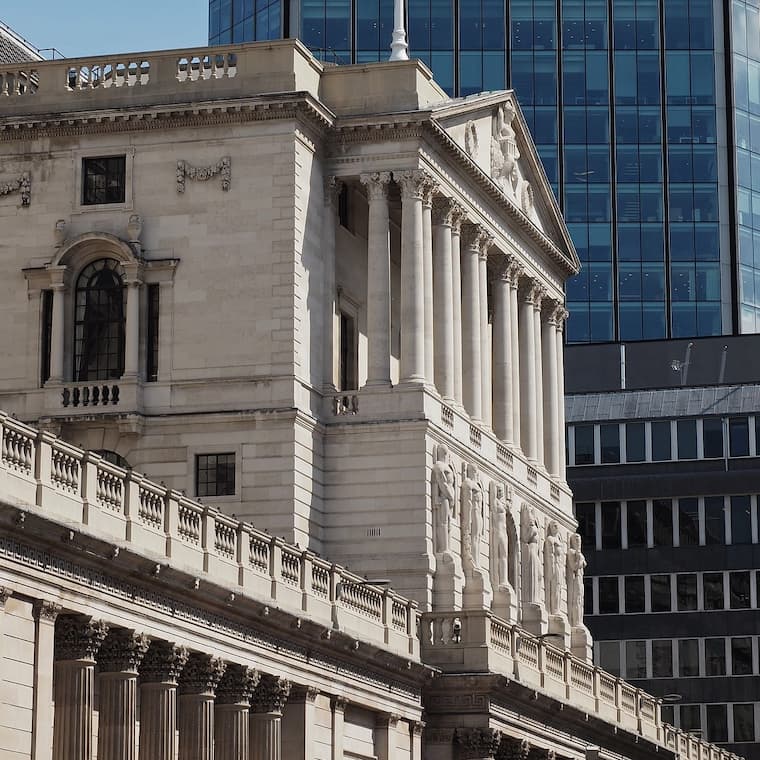Wealth Strategies
BoE To Hold Interest Rates Despite Inflation Drop – Wealth Managers React

After UK annual headline inflation came in at its 2 per cent target in May, as expected, wealth managers discuss the timing of a potential interest rate cut.
UK annual headline inflation came in at 2 per cent in May, down from 2.3 per cent in April, reaching its lowest level since July 2021, caused by easing energy and food costs, according to data from the Office for National Statistics.
Ahead of the UK elections on 4 July, the figures were described by Prime Minister Rishi Sunak as “very good news.” He said the Conservative party, which is far behind the Labour party in the polls, had restored economic stability and could consequently cut taxes.
Nevertheless, core inflation, which strips out energy and food costs, came in at 3.5 per cent in May, down from 3.9 per cent in April, but still relatively high.
In view of this, the Bank of England’s(BoE) Monetary Policy Committee (MPC) is expected to hold interest rates at 5.25 per cent at its meeting on Thursday, and speculation is growing for a potential rate cut in August or possibly September.
A rate cut would be significant, as lower interest rates typically reduce the cost of borrowing, and some high street lenders have already made mortgage rate cuts, in anticipation of this. Lower interest rates also tend to boost demand for certain equities, as investors seek higher returns in a low yield environment. A further delay could also risk putting the UK economy into a recession.
Here are some reactions from wealth managers to the latest figures.
Yvan Mamalet, senior market strategist, SG Kleinwort
Hambros
“By the time of the early August meeting, the BoE may have enough
confidence that inflation is well-entrenched at around target
(even though a rebound later this year seems likely) to start
cutting rates. We continue to expect two cuts this year.”
Isabel Albarran, investment officer at Close Brothers
Asset Management
“While the futures market has now pushed out its
prediction for the first cut to November, we wouldn’t rule out a
September cut just yet. However, it all depends on how the
data pans out. While today’s on-target consumer price index
(CPI) print and the recent rise in
the unemployment rate are promising, activity is
reviving and inflation is likely to climb higher
towards the end of the year, which may undermine the case
for cuts. However, as the European Central Bank’s (ECB)
recent move illustrates, policymakers can cut rates but
still leave policy restrictive.”
Daniele Antonucci, chief investment officer at Quintet
Private Bank (parent of Brown Shipley)
“This points to a first 0.25 per cent rate cut in August. After
that, we expect at least an extra cut this year, and then a
series of further rate reductions to bring the bank rate down
from its current 5.25 per cent to around 3.25 per cent at
end-2025. By and large, the slowing in this key component has
been relatively gradual, which is another reason to project
moderate rate cuts, rather than sharp and frontloaded ones.”
Luke Bartholomew, deputy chief economist,
abrdn
“The big question now is whether underlying inflation pressures
in the economy are consistent with inflation staying around 2 per
cent in the medium term, or whether inflation will start to edge
higher again once favourable base effects fade. On that front,
there is still evidence of residual stickiness in services
inflation, reflecting the strength of wage growth recently. But
we think the bank’s communication will set out a path for a cut
in August, which is now looking increasingly likely.”
“As with so many things, when it comes to financial planning, prevention is very often better than the cure. It is still important that savers and investors look at building inflation mitigation into their long-term strategies. Here, advisors’ expertise and support will really make a difference,” Jonny Black, chief commercial and strategy officer at abrdn adviser, added.
Tim Graf, head of EMEA macro strategy at State Street
Global Markets
“The good news on prices is that we do track some recent
normalisation in our online inflation data captured by
PriceStats. But the September BoE meeting looks the earliest
opportunity for a cut.”
Tobias Gruber, founder and CEO of My Community
Finance
“Savers should act now because while many savings rates are
currently beating inflation, the best easy-access deals are
vanishing fast. Rates are dropping as savings' providers
anticipate a rate cut later this year, and when one provider
makes a move, others quickly follow suit. There are still
excellent opportunities for fixed-rate savings, with some
providers offering interest rates of over 5 per cent. If you
don't need immediate access to your money, locking in a
competitive fixed rate now can protect you from future base rate
cuts. Just make sure you have emergency savings accessible
because fixed-rate saving accounts typically don't allow
withdrawals until your term ends.”